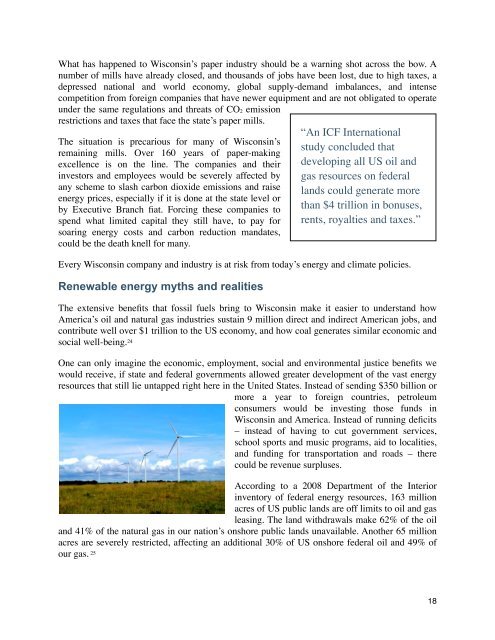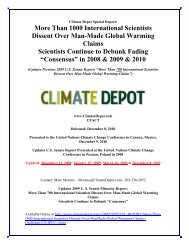to download the full report in PDF format - cfact
to download the full report in PDF format - cfact
to download the full report in PDF format - cfact
- No tags were found...
You also want an ePaper? Increase the reach of your titles
YUMPU automatically turns print PDFs into web optimized ePapers that Google loves.
Committee For A Constructive Tomorrow • 1875 Eye Street NW • 5th Floor • Wash<strong>in</strong>g<strong>to</strong>n, DC 20006What has happened <strong>to</strong> Wiscons<strong>in</strong>’s paper <strong>in</strong>dustry should be a warn<strong>in</strong>g shot across <strong>the</strong> bow. Anumber of mills have already closed, and thousands of jobs have been lost, due <strong>to</strong> high taxes, adepressed national and world economy, global supply-demand imbalances, and <strong>in</strong>tensecompetition from foreign companies that have newer equipment and are not obligated <strong>to</strong> operateunder <strong>the</strong> same regulations and threats of CO2 emissionrestrictions and taxes that face <strong>the</strong> state’s paper mills.The situation is precarious for many of Wiscons<strong>in</strong>’srema<strong>in</strong><strong>in</strong>g mills. Over 160 years of paper-mak<strong>in</strong>gexcellence is on <strong>the</strong> l<strong>in</strong>e. The companies and <strong>the</strong>ir<strong>in</strong>ves<strong>to</strong>rs and employees would be severely affected byany scheme <strong>to</strong> slash carbon dioxide emissions and raiseenergy prices, especially if it is done at <strong>the</strong> state level orby Executive Branch fiat. Forc<strong>in</strong>g <strong>the</strong>se companies <strong>to</strong>spend what limited capital <strong>the</strong>y still have, <strong>to</strong> pay forsoar<strong>in</strong>g energy costs and carbon reduction mandates,could be <strong>the</strong> death knell for many.Every Wiscons<strong>in</strong> company and <strong>in</strong>dustry is at risk from <strong>to</strong>day’s energy and climate policies.Renewable energy myths and realities“An ICF Internationalstudy concluded thatdevelop<strong>in</strong>g all US oil andgas resources on federallands could generate morethan $4 trillion <strong>in</strong> bonuses,rents, royalties and taxes.”The extensive benefits that fossil fuels br<strong>in</strong>g <strong>to</strong> Wiscons<strong>in</strong> make it easier <strong>to</strong> understand howAmerica’s oil and natural gas <strong>in</strong>dustries susta<strong>in</strong> 9 million direct and <strong>in</strong>direct American jobs, andcontribute well over $1 trillion <strong>to</strong> <strong>the</strong> US economy, and how coal generates similar economic andsocial well-be<strong>in</strong>g. 24One can only imag<strong>in</strong>e <strong>the</strong> economic, employment, social and environmental justice benefits wewould receive, if state and federal governments allowed greater development of <strong>the</strong> vast energyresources that still lie untapped right here <strong>in</strong> <strong>the</strong> United States. Instead of send<strong>in</strong>g $350 billion ormore a year <strong>to</strong> foreign countries, petroleumconsumers would be <strong>in</strong>vest<strong>in</strong>g those funds <strong>in</strong>Wiscons<strong>in</strong> and America. Instead of runn<strong>in</strong>g deficits– <strong>in</strong>stead of hav<strong>in</strong>g <strong>to</strong> cut government services,school sports and music programs, aid <strong>to</strong> localities,and fund<strong>in</strong>g for transportation and roads – <strong>the</strong>recould be revenue surpluses.Accord<strong>in</strong>g <strong>to</strong> a 2008 Department of <strong>the</strong> Interior<strong>in</strong>ven<strong>to</strong>ry of federal energy resources, 163 millionacres of US public lands are off limits <strong>to</strong> oil and gasleas<strong>in</strong>g. The land withdrawals make 62% of <strong>the</strong> oiland 41% of <strong>the</strong> natural gas <strong>in</strong> our nation’s onshore public lands unavailable. Ano<strong>the</strong>r 65 millionacres are severely restricted, affect<strong>in</strong>g an additional 30% of US onshore federal oil and 49% ofour gas. 2518



